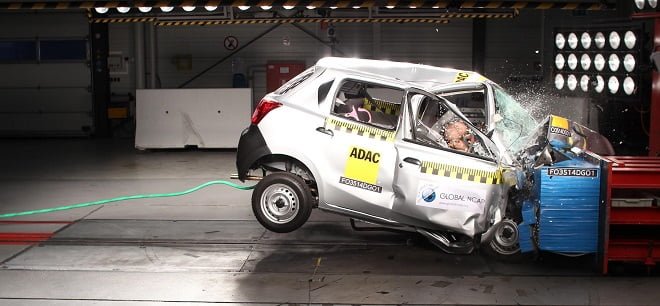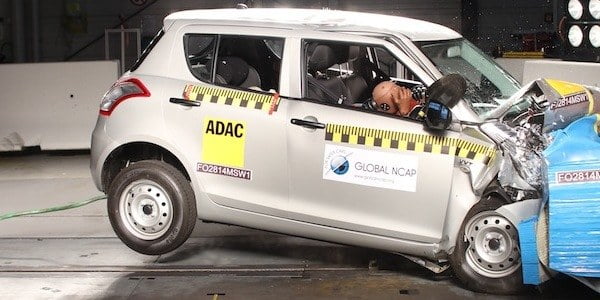The crash test results conducted recently on the Maruti Suzuki Swift and Datsun GO created quite a furore in the country as they failed to pass the test and were awarded a safety rating of zero. This has brought to light the need for a mandatory crash test for vehicles sold in India so that they possess a minimum level of crash worthiness to ensure occupant safety. A mandatory frontal crash test is being proposed by the Government for each vehicle to determine their safety rating to be implemented from October 2015.
Road transport secretary Vijay Chhibber said, “We will notify the regulatory norm by next March when facilities to carry out such test will be ready. Then the manufacturers will have over six months to comply with the norm. When they can produce cars with minimum and mandatory safety requirement for other countries, why can’t they do the same for our domestic buyers?”
The proposed crash test will involve a front impact collision at a speed 56kmph. Other tests will also be conducted for assessment of occupant safety and a proposed star rating will be awarded to each vehicle under the proposed Bharat New Vehicle Safety Assessment Program (BNVSAP). The testing process will be carried out at the NATRiP or National Automotive Testing and R&D Infrastructure Project facilities located all over India including major cities like Delhi (Manesar), Chennai, Pune (ARAI), etc.
The recent tests conducted by Global New Car Assessment Programme (NCAP) by a UK-based independent charity, focused on consumer-oriented vehicle safety initiatives on the Maruti Suzuki Swift and Datsun GO earned the two vehicles a ZERO rating. The two models were the most basic variants without airbags and ABS and hence faired badly in terms of occupant safety. While the addition of an airbag would improve its rating the Datsun GO’s structure on the other hand has been declared so unstable that adding an airbag would be redundant and will not prevent life threatening injuries. This test results are especially worrying since airbags and ABS are not mandatory features and are generally offered by manufacturers on higher variants to keep the costs of entry level variants low. A lack of awareness amongst the Indian consumers also means that they are reluctant to shell out extra for safety features.
Max Mosley, chairman, Global NCAP, said, “India has the potential to be a world leader in the automobile industry but Indian consumers are not aware of how unsafe they would be in case of a crash.” The introduction of a mandatory frontal crash test would ensure that every car sold in India would have a proper structure along with minimum safety features. The direct implication of such a test would be to make airbags and ABS mandatory pushing up prices of entry level variants but it will also guarantee occupant safety which is of utmost importance.
Read more about the Global NCAP



